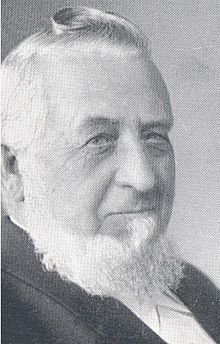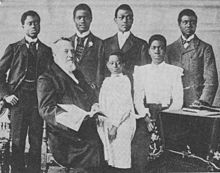Eduard Scheve
Eduard Scheve (born March 25, 1836 in Volmarstein , † January 10, 1909 in Berlin ) was a Baptist preacher and is considered to be the founder of the Evangelical Free Church Diakonie and external mission.
Life
Eduard Scheve came from a long-established Volmarstein family, whose descendants are still part of the town's inhabitants today. Under the influence of the Lower Rhine Pietism , Scheve tried to lead a Christian life as a young man . He subsequently joined the Christian youth and men club to which, under the direction of the then regional church pastor Friedrich Ringsdorff stood.
The lecturing activities of the German-American theology professor and Baptist preacher August Rauschenbusch ensured that Ringsdorff and with him a large part of the youth and men's association were baptized as adults and became the nucleus of the Volmarsteiner Baptist congregation. In 1854, only five weeks after this congregation was founded, Scheve von Rauschenbusch was also baptized .
As a 20-year-old, the trained tailor Scheve went on the wanderings that are common in craft circles . He came to Hamburg and joined the local Baptist congregation there in April 1856 (today the Evangelical Free Church congregation Hamburg I with Johann Georg Oncken Church). In addition to his professional work, he was involved in various areas of the community and founded a flourishing Sunday school in Bahrenfeld against the resistance of the local Prussian police . In the spring of 1857 he was first commissioned by the Hamburg parish council to lead a Baptist church service in Rosenweide an der Elbe in Hanover (today a district of Stelle ). Further preaching services followed in the area of Hamburg, during which his talent for service as a full-time missionary was soon discovered. The Association of the Northwest German Baptist Congregations (today Baptists in the Northwest ) appointed him on the recommendation of the Hamburg congregation as their mission worker and assigned him the Oldenburg villages on the left bank of the Lower Weser as a field of work . He was responsible for 15 preaching stations in this area. Brake became the center of his work .
At a preachers' conference that took place in February 1859 in the Felde Baptist Chapel near Westerstede and in which Johann Gerhard Oncken also took part, it was decided to send Eduard Scheve to a theological course at the newly founded Hamburg Mission School . After graduating, Scheve resumed his position as a "mission worker" in Oldenburg , which he held until July 1863.
After 1863 he worked in the Herford area . In 1864, Scheve was imprisoned at the instigation of the Lippe regional church "for illegal administration of the sacraments" ( baptism , communion ). He shared the fate of many Free Churches and dissidents of that time. Due to a guarantee, Scheve was released from custody after seven days, but had to be available for the upcoming court hearing. On June 13, 1864 he was sentenced to one and a half years in prison by the court in Bückeburg . After a petition for clemency from Prince Adolf I Georg in Schaumburg-Lippe , the prison sentence was waived, but Scheve was expelled for life. Scheve opposed this order. In his memoirs it says: "But it was no obstacle to me to testify of Jesus undisturbed in the small country, which I explained to the judge without reservation."
Scheve left his area of activity and took over the pastoral service of the Baptist congregation in Cologne from 1867 to 1880 . He then moved to Wiesbaden .
In 1884 Scheve was appointed co-pastor of the Berlin community, Schmidstraße ( Berlin-Luisenstadt ). Three years later, through Scheves' initiative, another Berlin Baptist congregation was founded in what is now Berlin-Friedrichshain , the Bethel congregation Gubener Strasse , which soon became independent with 300 members. He remained connected to this congregation as a pastor until the end of his life.
meaning
"Eduard Scheve was decidedly a founder". He initiated several institutions and associations within the German Baptist Union, for example:
- 1863: Bund der Jünglingsvereine, forerunner of today's community youth organization of Evangelical Free Churches
- 1885: Free Church Sunday School Association ; Scheve was also its first travel secretary.
- 1887: Diakonissenanstalt Bethel Berlin , Gubener Straße 11, first Diakoniewerk of the German Baptists, extension in 1899 with Deaconess Mother House at Emdener Straße 15, Berlin-Moabit
- 1890: Cameroon Mission, the first foreign mission of the German Baptists ( see main article European Baptist Mission )
- 1901: Brotherly Association of German Baptist Preachers, the forerunner organization of today's Evangelical Free Church Brotherhood of Preachers
From 1885 to 1891 Scheve was a member of the school commission of the Hamburg seminary . From 1875 to 1908 he was a leading member of the committee of the German branch of the Evangelical Alliance .
Publications (selection)
- A hike on the parish and mission field of the German Baptists . 1882.
- The divine and ungodly centralization . 1896.
- The mission of the German Baptists in Cameroon (West Africa) from 1884-1901 . Cassel 1901.
- Look behind the gentleman! Memoirs , (1st part) 1908.
literature
- Günter Balders : Short biography of Eduard Scheves . In: One Lord, One Faith, One Baptism - 150 Years of German Baptist Congregations . Oncken, Kassel / Wuppertal 1984 (1989), ISBN 3-7893-7883-6 .
- Günter Balders (Ed.): Trust the Lord! Blossoms and fruits of a life for congregation, mission and diakonia . Oncken, Kassel / Wuppertal 1979, ISBN 3-7893-7119-X .
Web links
Individual evidence
- ↑ Günter Balders (Ed.): Trust the Lord! Blossoms and fruits of a life for congregation, mission and diakonia . Oncken, Kassel / Wuppertal 1979, ISBN 3-7893-7119-X , pp. 18-20.
- ↑ Eduard Scheve: Look behind the gentleman! (1st part), Cassel 1908
- ↑ Quoted from: Rudolf Donat: Becoming and working of a Christian community in a hundred years. 1854-1954. The Evangelical Free Church Community of Hanover (Baptist Congregation) and its friends , Kassel 1955, p. 37.
- ^ Günter Balders: Article Eduard Scheve , in: Evangelisches Gemeindelexikon
| personal data | |
|---|---|
| SURNAME | Scheve, Eduard |
| BRIEF DESCRIPTION | German Baptist preacher and founder of the Evangelical Free Church Diakonie and foreign mission |
| DATE OF BIRTH | March 25, 1836 |
| PLACE OF BIRTH | Volmarstein |
| DATE OF DEATH | January 10, 1909 |
| Place of death | Berlin |


